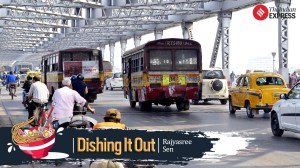#1. Truth knows no color.
The quote is easy; your insight shouldn’t be
Did you expect such an easy quote? UPSC chose to inaugurate this year’s Mains paper with an essay on a value — one of the most important for the human race: truth. The quote is attributed to Frederick Douglass, who was an American social reformer, abolitionist, and statesman. He was the most significant leader of the African-American civil rights movement in the 19th century. He said, “Right is of no Sex — Truth is of no Color — God is the Father of us all, and we are all brethren.” (1847) Do you know who he was? If you don’t, it’s fine. If you know him, it’s a brownie point.
But simply speaking, the quote — as it appears at face value — means that truth is universal and impartial; it is not influenced by race or color. One value leads to others: justice, fairness, impartiality, equality, and morality should not be based on race or be discriminatory of any kind.
While there is definitely ample scope to write on slavery, civil rights, discriminations of various kinds, and connect it to Gandhi’s popular concept of truth (“There is no religion higher than Truth and Righteousness.”), the major challenge is how to stand out. You may write about the antithesis: remember Foucault, who believed that truth is related to power structures. Or you may take us through lived experiences which suggest that although ultimate moral truths may be universal, our access to them is often filtered through the lens of discrimination. We are living in an age where every second day truth is contested, in the home, office, and society. It’s your truth vs my truth. However, it is advised not to miss the overall positive tone.
A simple quote is a confidence booster for many candidates — especially if it is also close to your Ethics paper. You must have definitely prepared essays on the theme of truth as a practice set. In previous years, questions on ‘truth’ have been asked in various forms: ‘Wisdom finds truth’ (2019), ‘Truth is lived, not taught’ (1996), ‘When money speaks, the truth is silent’ (1995), ‘Search for truth can only be a spiritual problem’ (2002). We say it’s a simple topic for a reason. Take this past year’s question based on the subject of truth and compare yourself: “Falsehood takes the place of truth when it results in unblemished common good.” — Tirukkural (2018, Ethics paper).
Easy to write, difficult to shine? Just saying.
#2. The supreme art of war is to subdue the enemy without fighting.
Predictable quote, calls for fresh wisdom and persuasive power
Who didn’t expect a quote on war, especially in the times we live in? Whether you prepared it as part of your ethics paper or essay, it must have brought a smile to your face for sure (not because of war, but the topic). No one expected a question asking you to justify war. So, the UPSC picked a quote that is mostly attributed to Sun Tzu (author of ‘The Art of War’) and advocates for strategic thinking, the art of persuasion, the strength of diplomacy, and the power of intellect over force.
Of course, you will support this quote—but how? Politically, philosophically, and morally? Since you may be India’s next diplomat, this is one skill that the examiners expect from you the most. Soft power is something that will definitely come to your mind. Victory without bloodshed—achieved through conversation—is the finest legacy of wise warriors. True that.
Story continues below this ad
But not all conversations are pleasant, and they may not always offer solutions. A simple question that may strike your mind is: “How can world leaders employ ethical principles to resolve global conflicts and prevent wars?” The recent talks between the US and Ukrainian presidents have drawn global attention, sparking questions about whether this is the right approach for leaders to address a situation that continues to impact lives. Should leaders revisit the ethics of international relations? How should global leadership approach war or engage with opposing parties in conflicts?
Anyway, war itself doesn’t necessarily mean armed conflict. Remember: the Cold War—or in today’s times, cyber warfare, sanctions, and economic warfare. Also, some conflicts cannot be resolved without fighting, as history tells us. In fact, excessive dependence on diplomacy or appeasement can backfire—the Munich Agreement (1938), which failed to prevent WWII, is a case in point.
But again, you know what line you have to stick to—coming from the land of Gandhi and Buddha, and as India’s next finest diplomat. Will you be able to persuade the examiner?
#3. Thought finds a world and creates one also.
Out-of-the-box thinking, but don’t over do it
Dive deep into philosophy, but here is a word of caution: don’t make things complex or boring, because this topic on ‘thoughts’ has the potential to ruin your flow of ideas. This simple quote is directive in nature—go with the flow. Talk about the power of ideas, human cognition, and imagination, which both discover and create reality.
Story continues below this ad
Basics: Thoughts are not passive; they discover, create, and invent. Take examples from science, philosophy, art, literature, etc. A different answer script may also include examples of social movements. Remember Kant, Plato, and other philosophers.
Also, remember that not all ideas and thoughts lead to something positive and constructive—they can be destructive too. So keep a balanced view.
But thoughts are limited by reality as well, aren’t they? External factors, delusions, overthinking, and over-idealizing impose constraints. Your thoughts may have wings (we hope so), but imagining flying unaided will have gravity to prevent it. Right?
Anyway, it’s not the content that is the problem. The real worry is the structure of the essay and the flow of your ideas. Your fear shouldn’t be the word limit, but rather the examiner losing interest. You have reached the mains level of the exam. Of course, you are wise. But is your essay tight?
Story continues below this ad
#4. Best lessons are learnt through bitter experiences.
Can you turn this ‘everyday quote’ to timeless widom?
How many times have you heard this quote? Every time you fall. Who better than a UPSC aspirant to write about it—but hold your feelings. This topic, like previous ones, has huge scope for citing examples from personalities, history, and philosophy. If you know quotes, poetry, and anecdotes, use them wisely.
But there is something about these quotes that may bother you. No matter how many examples you know, the theoretical part is often what you may lack. Remember, examples should support your arguments, not the other way around. So, for example, think: Why do bitter experiences teach us best? Why do they have a lasting impact? How do failures highlight weaknesses more clearly than success does? Connecting to philosophy will always give you an edge, like Buddhist philosophy: “Suffering as a path to enlightenment.” Reflect on what qualities are cultivated through hardships.
But what about positive experiences? Is it only failure that has the power to impact? Learning from positive experiences, mentorship, or observation also matters. Some lessons come from inspiration, not only from suffering. At times, excessive bitterness or trauma can hinder growth if not processed well.
Caution: You don’t need to make it a gloomy essay, even if the topic suggests so. Also, don’t start filling pages by talking only about your personal failures and losses. Emotions in check, clarity in command.
Story continues below this ad
Section B
#5. Muddy water is best cleared by leaving it alone.
When the counterpoint matters as much as the quote
How good are you with metaphors? Here’s a test through this quote: Stirring muddy water only makes it more opaque. But by leaving it still, the sediment settles naturally. So, non-action clears the water.
What does “muddy water” mean here? It may represent chaos in the human mind, conflicts in personal life or the world, and emotions clouded by confusion. In this sense, our minds are like muddy water. All these situations require the virtue of stillness. So, we may deduce that clarity often comes not from action, but from non-action. Let’s allow time and space to do what unnecessary effort cannot. This should remind you of patience, restraint and reflection.
But the battle doesn’t end here. The real challenge is to build content.
If you’ve read good books or have an interest in philosophy like Taoism, writing the content is a cakewalk. Even if you don’t, you can still talk about emotional and mental regulation or the power of meditation. Reflect on how emotions and thoughts settle before making decisions. Suggest how this quote holds value in emotional healing,personal relationships, leadership, and governance.
Story continues below this ad
There is a counterpoint too and expressing that is a challenge as well. Not all muddy situations clear up on their own. For example, injustice or emergencies often require immediate action, don’t they? Silence in the face of moral wrongs is not wisdom in any sense.
So, ultimately, it’s about knowing when to step back and when to step in. Even in choosing the topic. Did this click with you?
#6. The years teach much which the days never know.
Only the brave proceed. Enter if you dare.
A strict ‘no’ for a topic where elaboration is a challenge. This quote, often attributed to Ralph Waldo Emerson, reflects on how some lessons only reveal themselves over time, beyond what can be grasped in a single day, moment, or event. So, daily experiences may be superficial but over years, those may mature into meaningful learning. Easy to decode. But how to proceed. What is the nature of daily experiences and what do we learn from them? What is the nature of time in learning? Can you think of examples? Ponder through examples of leadership and history.
Neuroscience tells that memory, emotion, and learning consolidate over time, especially through lived experience. So, Wisdom is not in the rush of days but in the silence of years. We learn through various stages of life. But can days teach too? Aren’t some moments powerful and transformative?
Story continues below this ad
Keep the structure tight: Interpret, analyze, illustrate and reflect. We understand that adding philosophical or psychological references for depth is not easy for everyone. But atleast avoid sounding too abstract. Can you ground this essay in relatable experiences? Tough, we know that. You have been warned (politely).
#7. It is best to see life as a journey not as a destination.
The examiner’s seen the quote—show them something they haven’t seen
Why viewing life as a journey leads to fulfillment, resilience, and personal development, whereas obsessing over destinations can create pressure, disappointment, and a shallow sense of success. Life as a journey in relationships: love grows in daily kindness, not just in reaching milestones. In careers: it’s not just about promotions, but about skills developed and relationships built. Obsession with results (destination) can lead to stress, burnout, and unhappiness.
It’s too simple to analyse. This is a very familiar quote, but writing an essay on it can be surprisingly tough. Here’s why:
Overfamiliarity breeds generic statements. The challenge is to write something fresh, insightful, and original, not just repeat what everyone already knows. Abstract ideas are hard to organise into thoughts. How will you balance examples, logic, and philosophy? The essay demands a mature understanding of life, growth, and time.
Story continues below this ad
Remember, the tone of the quote is idealistic. But a good essay should also explore counterpoints. For example: isn’t the destination important in some cases? Without an antithesis, the essay will be one-sided. Such an essay will require diverse examples. So, for essays like this, depth, balance, and originality are qualities that are needed—but not easy to produce on the spot, especially under exam pressure. Can you think of unique angles or examples to help you avoid clichés in this essay?
#8. Contentment is natural wealth, luxury is artificial poverty.
Heard it, loved it, now write on it!
Socrates is back in the question paper. It’s a simple quote to decode—yet again. “True happiness and fulfillment come from within, from being satisfied with what you have, rather than seeking external validation through material possessions.” Easy, isn’t it?
Highly relevant in today’s materialistic world, the quote offers rich ground to explore themes like minimalism vs. materialism, inner peace vs. external excess, and needs vs. wants. It will be rewarding to quote Stoicism, Buddhism, Gandhi, etc., to support your argument. In contemporary contexts, reflect on the age of consumerism, social media, fast lifestyles, mental health and burnout, the pressure to “have more,” sustainability, and simple living.
There is scope for comparative thinking too — explore different cultures, ideologies, and economic systems.
Here’s a piece of advice: this essay works best when you treat contentment not as a lack of desire, but as a higher-order value—a conscious choice not to be enslaved by endless craving.
But here’s a word of caution as well: nobody likes it when you are preachy!
Overall, it can be said that abstract ideas must be well-organized. The challenge is also how you stand out without missing the essence of the quote. Also, without an antithesis, such essays may appear one-sided. But most importantly, since there is no Artificial Intelligence (AI) tool allowed in the examination hall, are you skilled enough to write a good essay under exam pressure—even if the topics seem simple? That is the point to ponder after the UPSC Mains 2025 Essay paper.
Check out our UPSC Essay Simplified series:
UPSC Essays Simplified : How to write Philosophical essays?
UPSC Essays Simplified: Understanding and Deconstructing the Essay topics – the first step
UPSC Essays Simplified: Ideation and Brainstorming of the topics – the second step
UPSC Essays Simplified: Structure and Flow of a good essay– the third step
UPSC Essays Simplified: How to write an introduction? – the fourth step
UPSC Essays Simplified: What goes in the body? – the fifth step
UPSC Essays Simplified: How to write a conclusion? – the sixth step
UPSC Essays Simplified: What are ‘Essay Extras’ in an impressive essay? – the seventh step
UPSC Essays Simplified : Types of content: What is S.T.E.P.P.E technique for dimensional analysis of Essays? — the eighth step
Subscribe to our UPSC newsletter and stay updated with the news cues from the past week.
Stay updated with the latest UPSC articles by joining our Telegram channel – Indian Express UPSC Hub, and follow us on Instagram and X.
For your answers, queries and suggestions write at manas.srivastava@indianexpress.com


































